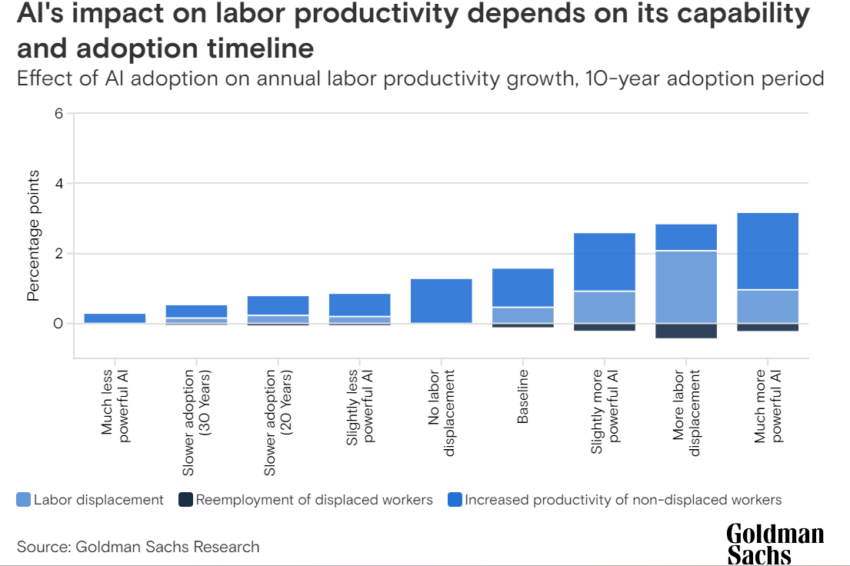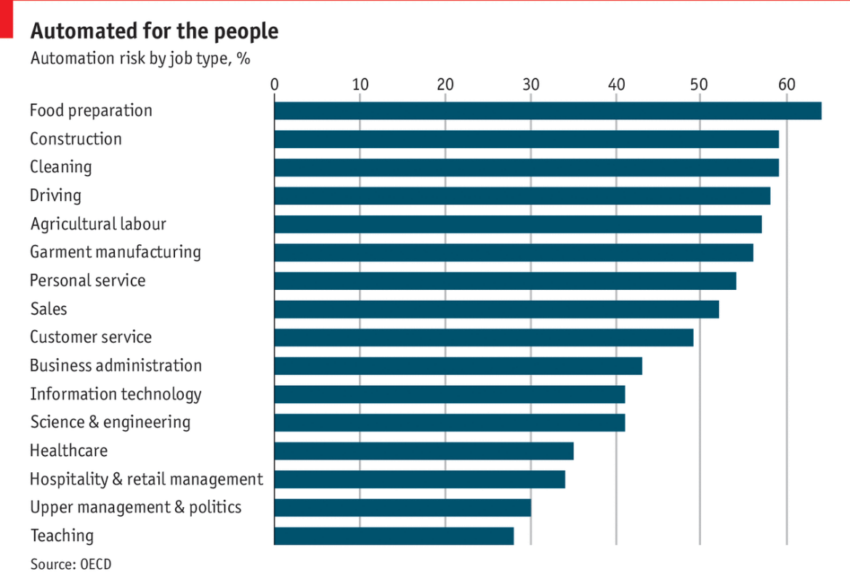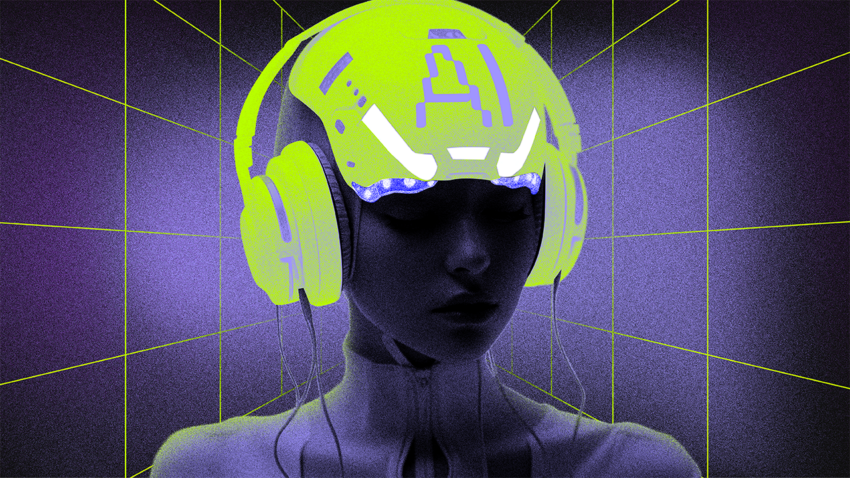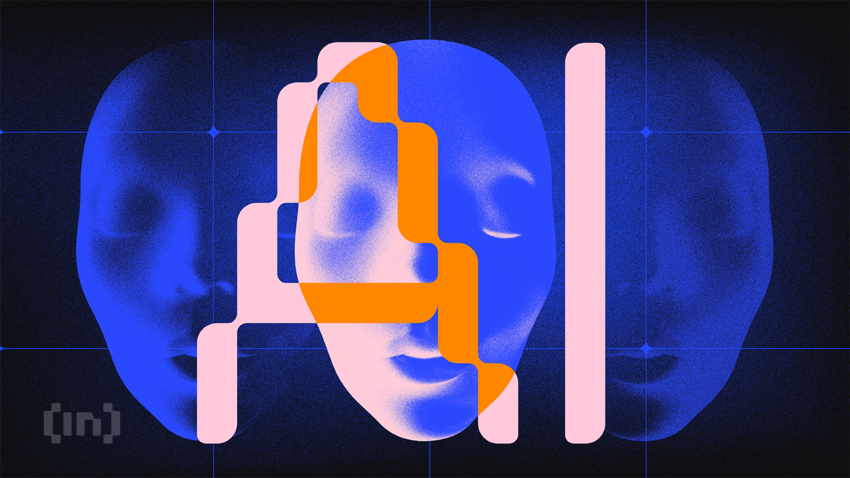Artificial intelligence has made massive leaps in capability and ease of use in the last few years, but will AI replace human roles? With tools such as Midjourney and ChatGPT, anyone can craft essays, articles, art, and various forms of expression without traditional skills.
However, it’s not just content creation; AI is rapidly permeating many sectors, from restaurants and courier services to major corporations. This article will examine which jobs are doing well in the AI age and which might be at risk.
In this guide:
- The AI Revolution: Job dynamics in the age of automation
- Fast-Track Your Dream Job in Just 2-3 Months!
- Find your dream job
- Machine learning and AI
- The threat to jobs: Will AI replace humans?
- Free NFT generator – Chain GPT
- Preparing for change: Learning and upskilling
- The synergy of human insights and AI solutions
- Real-world tips for thriving in the age of AI
- AI is a threat but also an opportunity
- Frequently asked questions
The AI Revolution: Job dynamics in the age of automation
According to OpenAI (the maker of ChatGPT) and the University of Pennsylvania, automation could expose the equivalent of 300 million full-time jobs. The research, conducted in 2023, indicates that around 80 percent of the U.S. workforce could see an impact on at least 10 percent of their tasks.
What just a few years ago seemed like a distant future or a sci-fi movie plot is rapidly becoming a reality. From deepfakes to AI-assisted journalism, artificial intelligence is already changing the world. But how so?

Fast-Track Your Dream Job in Just 2-3 Months!
Find your dream job
Machine learning and AI
Machine learning is responsible for most of this disruption as it enables machines to analyze data and emulate certain tasks traditionally performed by humans. The technology has been used since the late 90s, often for simple tasks such as sorting mail and assessing loan applications and credit risks.
However, over the last few years, machine learning has become capable of far more complex tasks. Its applications span from sequencing RNA to developing vaccines, utilizing algorithms, and modeling human speech.
In a research paper published by the University of Oxford in 2017, a group of AI experts from the Future of Humanity Institute at Oxford University predicted several milestones in AI advancements. Most indicated that by 2026, machines would be composing school essays. Other predictions included self-driving trucks replacing drivers by 2027 and AI replacing humans in various retail positions by 2031.
Meanwhile, PwC’s Global Artificial Intelligence Study: Exploiting the AI Revolution projects that by 2030, the widespread adoption of artificial intelligence could boost the global economy by up to $15.7 trillion. These advancements represent remarkable opportunities for humanity but pose dangers, too.
Industries embracing job automation and AI
Modern AI has already had a significant impact on various industries that rely on data-driven models. Big players like Google, Amazon, Microsoft, and Apple invest billions annually in artificial intelligence and automation.
Universities are also integrating AI into their teaching, and even the U.S. Department of Defense is getting more involved in AI development. While some industries are just beginning to explore AI, others — including the financial and retail sectors — are further ahead.
AI offers numerous advantages, enhancing efficiency across industries, streamlining processes, and reducing costs. Nonetheless, the risks are significant. Job displacement is a clear concern as automation and AI take over routine tasks, potentially impacting various industries and skill levels. Privacy concerns arise from AI-driven surveillance and data collection, raising questions about personal information security. In addition, ethical dilemmas also emerge, especially concerning important decisions made by autonomous systems in critical situations.
The threat to jobs: Will AI replace humans?
“In order to automate a knowledge-based job, you don’t need a robot or any expensive machinery, all you need is software, an algorithm. That’s what ChatGPT, in particular, has really brought into focus.”
Martin Ford, American Futurist
Humanity has come too far with AI development and automation, which has ushered in a new era of technological progress and innovation. So far, we know these technologies will replace many human workers, but what about the job sector?
The concerns surrounding AI’s potential
At the heart of this debate lies a set of legitimate concerns about artificial intelligence’s impact and potential to displace human workers. We’ve wrapped up the key concerns about this discussion:
- Job displacement: The most immediate concern revolves around job displacement. Many fear that as AI systems become more sophisticated, they will take over tasks and roles currently performed by humans.
- Economic inequality: The fear of economic inequality is closely tied to job displacement. If AI replaces jobs at a rapid pace, there’s a risk that certain individuals and communities may be left behind, strengthening income inequality and socioeconomic disparities.
- Loss of human touch: Some roles require a human touch, empathy, and emotional intelligence, which are challenging for AI to replicate. However, the increasing use of AI in roles like healthcare and caregiving might lead to a loss of the personal touch that humans provide.
Data on vulnerable jobs

The automation of tasks threatens both blue and white-collar jobs. Robotics are increasingly taking over manual labor typical of blue-collar roles, while AI and advanced software are beginning to perform tasks traditionally reserved for white-collar positions.
The following jobs are among those most susceptible to AI-driven changes:
Manufacturing and repetitive tasks
Jobs involving routine and repetitive tasks on factory floors, such as assembly line work and quality control, are at high risk of job automation. Amazon is a great example of that. In the last decade, the company has deployed over 500,000 mobile warehouse robots while hiring over a million human workers during this timeframe to counter the notion of work automation and human replacement.
Additionally, the tech giant has been running tests on pinch-grasping robots for e-commerce fulfillment.
Data entry and analysis
In a 2016 Ted Talk, Anthony Goldbloom stated that machines are set to outperform humans:
“We have no chance of competing against machines on frequent, high-volume tasks.”
Anthony Goldbloom
Jobs focused on data entry, and rudimentary data analysis are particularly susceptible to automation. The capabilities of AI to swiftly and precisely process extensive data diminish the demand for human intervention in these repetitive tasks. However, it’s important to recognize that AI is not yet adept at nuanced understanding and high-level interpretation. The good news is that roles centered around advanced analysis, decision-making, and human intuition will remain indispensable.
Journalists

Automated journalism algorithms can generate news articles based on data and templates, which may affect some types of journalism, such as sports reporting or financial journalism. Several media portals and organizations have used AI and automation to assist or augment their journalistic processes.
Reuters, for instance, uses AI and automation to generate news stories on topics like financial earnings reports. BBC News Lab has experimented with AI-driven content generation to create news summaries and automated stories for specific topics.
Forbes uses an AI tool, Bertie, to assist journalists in suggesting topic ideas and finding data-driven insights for their articles.
Programmers and coders
Similar to data entry and analysis, basic programming, and coding are very likely to be replaced by AI. As per a study conducted jointly by Microsoft and MIT, software developers utilizing Copilot were able to write code 55% faster compared to their counterparts who followed traditional coding methods.
These jobs are likely to shift towards monitoring artificial intelligence instead of programming and coding. Among the software developers who retain their positions, many will transition into roles like “prompt engineers” — individuals adept at crafting the best prompts for automated coding applications.
Marketers
The landscape for content marketers is evolving rapidly. While ChatGPT is currently the leading tool, a surge of new AI tools and content creation platforms, including ClickUp, Jasper.ai, and Synthesia, are making their mark in the industry.
In other areas of marketing, AI-driven marketing tools and analytics platforms can automate tasks such as ad targeting, content recommendations, and data analysis, potentially reducing the need for manual marketing efforts.
Like programmers and other jobs that don’t require high-level skills, AI will most likely affect low-quality content forms. Businesses and organizations are increasingly integrating AI to streamline operations and reduce overhead costs associated with entry-level positions.
“The businesses and organizations that succeed with AI will be those that invest steadily, rise above the hype, make a good match between their business problems and the capabilities of AI, and take the long view.”
Tom Davenport: The AI Advantage
Customer service
Traditional customer service roles often involve handling basic inquiries, providing routine support, and addressing frequently asked questions. These tasks, while essential, can be time-consuming and often require customer service representatives to follow scripted responses.
Many customer service roles can be automated through chatbots and virtual assistants, especially those involving basic queries and support. These AI systems are available 24/7 and can handle a high volume of inquiries efficiently and at a higher speed.
Graphic design
Free NFT generator – Chain GPT
Utilizing AI in the realm of design, this tool adeptly produces tailored images and illustrations from user input within mere seconds, echoing ChatGPT’s proficiency in text generation for the visual domain. In other words, tools like DALL-E 2 and Midjourney may easily replace basic designs such as logos, illustrations, advertisements, and branding materials.
However, there will always be a market for higher-end work. Human graphic artists bring unique perspectives, innovation, and the ability to create unique designs tailored to specific clients and projects that machines might be unable to replicate.
Preparing for change: Learning and upskilling
Instead of only seeing job displacement, we should recognize how AI can boost human productivity and spawn new job opportunities.
Jobs that were once considered stable are now being redefined or replaced altogether. This fundamental change requires a proactive response from job seekers and professionals alike. For that, adaptability is becoming the cornerstone of career resilience.
It’s no longer sufficient to rely solely on the skills and knowledge acquired during formal education or early career stages. Lifelong learning and continuous upskilling have become essential strategies for staying relevant in the AI age. Julia Motorina, HR team lead at BeInCrypto, shares:
“Cultivating a mindset of learning and skill enhancement isn’t just a choice; it’s a necessity. In the age of AI, adaptability and a passion for continuous growth will be the defining factors that empower professionals to not only thrive but to lead the way in shaping the future of work in both centralized and decentralized environments.”
Julia Motorina
As mentioned by Motorina, the journey of lifelong learning and upskilling for job seekers and professionals begins with a mindset shift. It’s about recognizing that adaptation is not a one-time event but an ongoing process. It’s also about seeking out educational opportunities, whether through formal courses, online platforms, or on-the-job experiences, to acquire and refine skills that align with the demands of the AI age. Here’s how to do it:
- Stay informed: Regularly research industry and employment trends, emerging technologies, and the impact of AI on your field.
- Seek feedback: Be open to feedback from HR professionals and employers regarding skills gaps and areas for improvement in case you work for a corporation.
- Collaborate: Embrace collaboration with AI systems and tools, leveraging their capabilities to enhance personal productivity.
- Network and mentor: Connect with mentors and peers who can offer guidance and insights into the evolving job market.
The synergy of human insights and AI solutions
The inevitability of AI and unprecedented technological advancements is not just about humans adapting to AI or AI replacing job roles. It’s about the incredible power that emerges when the two collaborate effectively.
At its core, how can humans and machines complement each other? Humans bring creativity, emotional intelligence, intuition, and complex problem-solving abilities to the table. Conversely, AI excels in processing vast amounts of data precisely, performing repetitive tasks tirelessly, and extracting insights from complex datasets at lightning speed.
Real-world tips for thriving in the age of AI
So, how can you effectively adapt and thrive in this evolving landscape shaped by AI and automation?

- Embrace lifelong learning: AI is evolving, and so should you. Learning to work with AI-powered design tools can elevate your skills if you’re a graphic designer. Websites like Coursera and Udemy offer courses on various AI-related topics, often with flexible schedules, making it easier to upskill while working.
- Find your niche: AI can’t replace your unique experiences and passions. In fact, it can amplify them. For instance, if you’re a content marketing specialist, you could focus on leveraging AI tools to analyze user behavior and preferences, helping you create highly personalized and engaging content.
- Diversify your skills: Today’s job market values versatility. Learn to adapt and diversify your skill set. For instance, if you’re a customer service representative, gaining expertise in managing AI-powered chatbots can make you more valuable to your organization.
- Stay informed: Stay up to date with industry and employment trends. Following industry publications and attending webinars or conferences can also keep you informed.
- Adapt and pivot: Don’t be afraid to pivot. If your role is becoming automated, consider transferring your skills to a related but less automatable field. For instance, transitioning to data analysis can be a smart move if you’re in data entry.
AI is a threat but also an opportunity
It is difficult to ascertain the extent to which AI will replace humans. While change is inevitable, but how we adapt to it is a choice. The AI revolution is reshaping our world. As machine learning, automation, and other innovative technologies redefine our daily routines, the landscape of work will evolve. While these shifts present uncertainties, they also bring unparalleled opportunities. In this transformative era, we must remain agile, continually enhance our skills, and stay updated. Embrace the change, be open to new pathways, and remember: it’s never too late to pivot in your career.
Frequently asked questions
Will AI replace all human jobs?
How can I prepare for the changes AI will bring to my job?
What jobs are most vulnerable to AI-driven automation?
What industries are most impacted by AI and automation?
Disclaimer
In line with the Trust Project guidelines, the educational content on this website is offered in good faith and for general information purposes only. BeInCrypto prioritizes providing high-quality information, taking the time to research and create informative content for readers. While partners may reward the company with commissions for placements in articles, these commissions do not influence the unbiased, honest, and helpful content creation process. Any action taken by the reader based on this information is strictly at their own risk. Please note that our Terms and Conditions, Privacy Policy, and Disclaimers have been updated.





